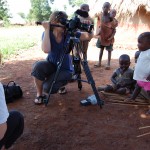Exposing injustice—Messiah College professor to film documentary in Uganda
 With a heart for social justice and peace, professor and filmmaker Krista Imbesi ‘09 will collaborate with Phil Wilmot ’12 to voice a story of injustice and hopeful reconciliation in the documentary, “Our Feet are Rooted,” exposing the illegal land grabbing crisis in Northern Uganda.
With a heart for social justice and peace, professor and filmmaker Krista Imbesi ‘09 will collaborate with Phil Wilmot ’12 to voice a story of injustice and hopeful reconciliation in the documentary, “Our Feet are Rooted,” exposing the illegal land grabbing crisis in Northern Uganda.
This June, Imbesi and her husband Christian ’09 will partner with Wilmot and his wife, Suzan, founders of the non-profit organization, Solidarity Uganda to tell the story of the Amuru District residents and their struggle against the corporate government violently stealing their land and selling it to multinational oil and sugarcane companies.
Solidarity Uganda endeavors to train the district in non-violent protesting and spread awareness of this conflict. In hopes of raising consciousness and creating support for the community, the team will submit “Our Feet are Rooted” to social justice themed film festivals and tour the film in Uganda and the United States after its completion next spring. Wilmot says, “This film will bring national and international attention to the conflict. It will serve as an advocacy tool to affect social and political change both near and far from Amuru.”
Imbesi entered this project with a pre-existing passion for Uganda cultivated during a summer service trip to Ugandan orphanages. Her experiences in Uganda prompted her to create the documentary, “Where We Belong”, explaining the implications of Westerners’ running Ugandan orphanages. This documentary screened at Messiah College’s Humanities Symposium last year and won the Jury Award at the DIY Film Festival in Los Angeles. After seeing “Where We Belong,” filmmaker Wilmot expressed interest in collaborating with the Imbesis to produce a film about the Amuru District community. The implications for the recent collaboration will be far-reaching. Wilmot says, “There is an empowering element to telling one’s story. Film is an effective platform for articulating human identity.”
 Imbesi’s ultimate goal in filming this documentary is to give a voice to the voiceless in the most ethical and accurate way possible; she wants to gain information directly from the local residents to best portray their struggle. Imbesi says, “What I would like to achieve is forming a collaborative project in which the subjects have a voice in the making of and interpretation of the film. We will be working with the community in finding out how they want this story told, and using our expertise in equipment and visual aesthetics to assist in the creation of the film.” She continues, “I happen to have the expertise and resources for filmmaking, but only the Ugandan people in the film will understand the nuances of their culture, what is or isn’t important to their story, and how they want that story to be told … and storytelling should always trump aesthetics in priority.”
Imbesi’s ultimate goal in filming this documentary is to give a voice to the voiceless in the most ethical and accurate way possible; she wants to gain information directly from the local residents to best portray their struggle. Imbesi says, “What I would like to achieve is forming a collaborative project in which the subjects have a voice in the making of and interpretation of the film. We will be working with the community in finding out how they want this story told, and using our expertise in equipment and visual aesthetics to assist in the creation of the film.” She continues, “I happen to have the expertise and resources for filmmaking, but only the Ugandan people in the film will understand the nuances of their culture, what is or isn’t important to their story, and how they want that story to be told … and storytelling should always trump aesthetics in priority.”
The residents of the Amuru District are excited to take part in the film’s creation. They are working to choreograph a dance displaying their frustration and struggle in this land conflict. The documentary will shed light on the crisis as it is shared throughout Uganda, even in unaffected areas. Imbesi says, “Outside of the community that is involved, it will be great to show Ugandans in other parts of the country what is happening. The conflict has been kept relatively quiet and many people in other parts of the country are unaware of it.”
Imbesi’s time at Messiah College served as inspiration for her post-graduate projects. She says, “My education at Messiah affected my perception of filmmaking through the idea that we are to be servants in our vocations. The film industry is full of people who are taught to emphasize their pride and their artistic integrity above all else … Putting aside pride in order to prioritize ethics in filmmaking practices is definitely something I learned at Messiah.”
Story by Katie Johnston ’15. Photos courtesy of Krista Imbsei.




